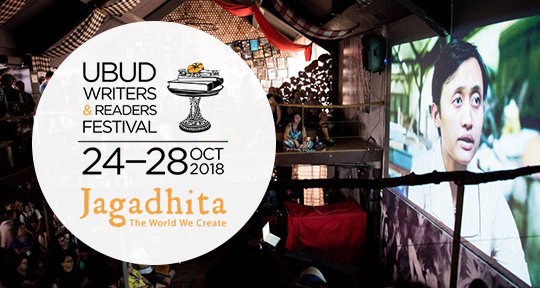Greetings from the Ubud Writers and Readers Festival (UWRF), which has just concluded its second day. Here’s a bit of historical background: founded in response to the 2002 Bali bombings, the festival celebrates its fifteenth anniversary this year. Since then, UWRF has successfully surmounted several challenges: In 2015, the local government censored festival discussions of the 1965 mass killings in Indonesia; last year, volcanic activity took a toll on festival participation, with many attendees and speakers canceling their flights. This year, we (Norman Erikson Pasaribu and Tiffany Tsao) were both invited to speak at the festival in our capacity as writers, and we thought we would share some of our impressions so far.
On Wednesday, the festival held a press call immediately before the festival’s official opening gala event. The press call featured festival founders Janet DeNeefe and Ketut Suardana, as well as some of the festival’s speakers, including Hanif Kureishi, Reni Eddo-Lodge, Avianti Armand, and Norman Erikson Pasaribu (hooray!). Ketut Suardana spoke about how they coined this year’s theme, Jagadhita – the world we create, and how we should live life according to dharma (goodness) and strive to attain ultimate happiness. When Norman was asked what he expected his writing to achieve, took the opportunity to observe that perhaps “goodness” and “happiness” shouldn’t be so universalized. Quoting a line from Marianne Katoppo, that “language is where theology begins,” he noted how we rarely refer to either concept in plural form. Such language places limitations on what it means to be happy and good, pressuring queer communities in Indonesia to conform to society and engage in self-erasure. Reni, when asked what advice she had for Indonesian feminists, humbly answered that she isn’t in a position to suggest anything to them without listening to them first since their experiences are very culturally specific and very different from hers as a British-Nigerian woman.

